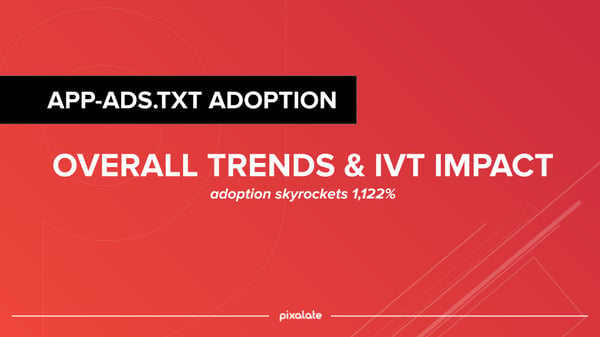
This week's review of ad fraud and quality in the digital advertising space.

Pixalate this week released the Q3 2019 App-ads.txt and Ads.txt Trends Report. The report features data and insights collected by Pixalate detailing the state of ads.txt adoption over the third quarter of 2019.

"US advertisers will spend almost $7 billion this year on connected TV ads," reported eMarketer. "Connected TV is growing rapidly as advertisers look to target audiences watching long-form, premium digital content on their living room screens." As OTT/CTV ad budgets rise, advertisers need to be on the lookout for ad fraud in programmatic.

Starting November 22, political ads will not be allowed on Twitter. "Ads that reference political content, including solicitations for financial support and appeals for votes, are not allowed," reported AdExchanger, with a specific carve-out to allow "'Get out the vote'-style ads."
"Twitter defines political content broadly as anything that references a candidate, political party, elected official, appointed government official, a referendum, ballot measure, legislation, regulation, directive or judicial outcome," added AdExchanger.

"A devious new scam is sweeping Facebook," wrote Mashable. "Scammers find an interesting or popular product from crowdfunding sites such as Kickstarter or Indiegogo, rip the item’s details, photos, and videos, and push them via Facebook ads as their own products. Victims of the fraud are either never sent the product or receive a knockoff version."

"[R]ecent headlines about a US government investigation into [TikTok's] Chinese parent company ByteDance regarding national security concerns have some marketers worrying," reported eMarketer. "An executive at a major advertising agency said that some clients have grown concerned about brand safety on TikTok," the article added.
*By entering your email address and clicking Subscribe, you are agreeing to our Terms of Use and Privacy Policy.
These Stories on Weekly Recaps
*By entering your email address and clicking Subscribe, you are agreeing to our Terms of Use and Privacy Policy.

Disclaimer: The content of this page reflects Pixalate’s opinions with respect to the factors that Pixalate believes can be useful to the digital media industry. Any proprietary data shared is grounded in Pixalate’s proprietary technology and analytics, which Pixalate is continuously evaluating and updating. Any references to outside sources should not be construed as endorsements. Pixalate’s opinions are just that - opinion, not facts or guarantees.
Per the MRC, “'Fraud' is not intended to represent fraud as defined in various laws, statutes and ordinances or as conventionally used in U.S. Court or other legal proceedings, but rather a custom definition strictly for advertising measurement purposes. Also per the MRC, “‘Invalid Traffic’ is defined generally as traffic that does not meet certain ad serving quality or completeness criteria, or otherwise does not represent legitimate ad traffic that should be included in measurement counts. Among the reasons why ad traffic may be deemed invalid is it is a result of non-human traffic (spiders, bots, etc.), or activity designed to produce fraudulent traffic.”

